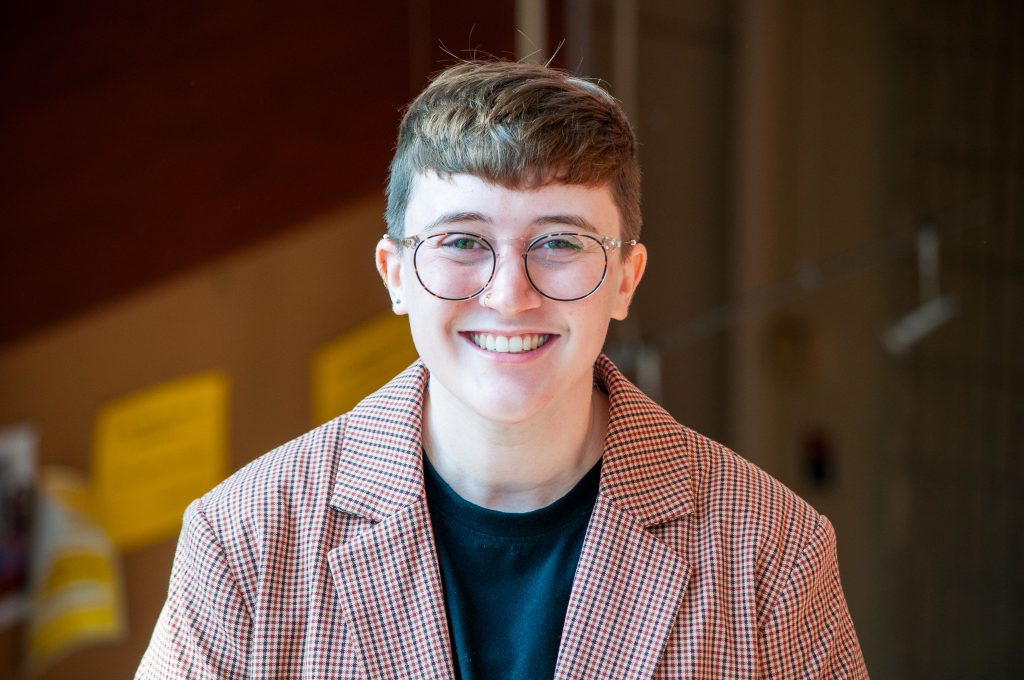Student empowers change through pro bono work

Whether you’re helping a college student contest their parking ticket or spending time with a child in the child welfare system, there is no question that pro bono work is all about making a positive impact on your community. At KU Law, students have the unique opportunity to engage in work that goes beyond the classroom and into the lives of people experiencing challenging life situations. Elm Beck, 3L, is one of those students and cites their work with Douglas County CASA, Inc. as one of the most fulfilling opportunities they’ve had a chance to undertake.
“I’m really passionate about the rights of kids in foster care,” said Beck. “Both of my parents were adopted and this gives me a personal connection with making sure kids in the system are being treated fairly and being taken care of.”
CASA stands for Court Appointed Special Advocate and is designed to connect children of all ages in the child welfare system with a safe, present and stable adult who can get to know them on a personal level and advocate for their best interests. The CASA volunteer will make at least bi-annual reports to the court that discuss everything from what’s going on in the child’s life to what the child needs to have a safe and healthy childhood. Many CASA volunteers are retired people who tend to have more time on their hands to do the intensive work required of a CASA volunteer. Beck wanted to do their part to offer a new viewpoint.
“I thought about who that tends to leave out in terms of having advocates who are culturally competent for certain younger communities,” said Beck. “I was really hopeful that I could get connected with a higher needs case and be able to help advocate for that child through that more unique lens as a Gen-Z person myself. I got really lucky and was matched with a child that I connect very well with. Supporting that connection has been one of the most rewarding parts about the experience.”
Beck hails from Kansas City and spent a large majority of their undergraduate career at KU looking for community activism and volunteer opportunities on campus. By the time they came to KU Law in 2021, Beck had already served as the president of the ACLU of KU and was eager to continue their acts of service within Green Hall and without.
“I knew that I wanted to do some kind of advocacy in the world,” said Beck. “When I was entering college, I realized that becoming a lawyer might be a way that I can harness advocacy. I felt that law school was a way I could get a bit more power behind what I was doing.”
Beck’s involvement in the CASA program is a time commitment, estimated about three hours a week, but a worthy one. Beck was required to attend about 35 hours of training to prepare for the program before being officially sworn in and appointed on the case by a judge.
“The time commitment is something to consider if you’re willing to take it on,” said Beck, “but for me, that paled in comparison to the importance of the work I was doing. I love getting to know my CASA child and hearing the opinions the child has about their life. I’m able to make more in-depth observations and understandings about what is in the child’s best interest.”
Through pro bono work, future lawyers like Beck can bridge the gap and provide legal support to underserved and marginalized communities. It is important that current and future lawyers realize the importance that their pro bono work serves.
“There is definitely a lot of room where we can make good work in the world,” said Beck. “Pro bono work is a great way that lawyers commit to doing something bigger than what they do just within their career. I think that is extremely important and is something the legal profession should continue to put an emphasis on now and in the future.”
Douglas County CASA, Inc. requires at least a one-year commitment from all their CASA volunteers, but Beck intends to stay with their CASA child until the child ages out of the system. As for future pro bono opportunities, Beck keeps an open mind and has some advice for anyone at KU Law interested in getting involved.
“Go talk to Professor Schnug because she had many opportunities and CASA was just the one I chose,” said Beck. “She talked me through at least four or five pro bono opportunities that you can do through KU Law. She knows a lot of resources out there to get involved.”
And for anyone in the law field, Beck stresses the importance of empathy and humility. “Always remember to be culturally competent and humble,” Beck said. “Being a lawyer is not the only thing that gives you credentials in the world. You need to be humble enough to understand that you’re not coming in to do pro bono work as some kind of savior. You are coming in to provide a service that you are capable of providing and learn from your client as well.”
–By Emma Herrman